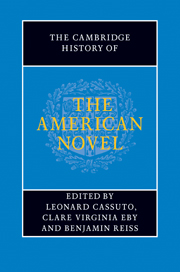Book contents
- Frontmatter
- General Introduction
- PART ONE INVENTING THE AMERICAN NOVEL
- PART TWO REALISM, PROTEST, ACCOMMODATION
- PART THREE MODERNISM AND BEYOND
- Introduction: modernism and beyond
- 37 Stein, Hemingway, and American modernisms
- 38 The Great Gatsby and the 1920s
- 39 Philosophy and the American novel
- 40 Steinbeck and the proletarian novel
- 41 The novel, mass culture, mass media
- 42 Wright, Hurston, and the direction of the African American novel
- 43 Ellison and Baldwin: aesthetics, activism, and the social order
- 44 Religion and the twentieth-century American novel
- 45 Faulkner and the Southern novel
- 46 Law and the American novel
- 47 Twentieth-century publishing and the rise of the paperback
- 48 The novel of crime, mystery, and suspense
- 49 US novels and US wars
- 50 Science fiction
- 51 Female genre fiction in the twentieth century
- 52 Children's novels
- 53 The American novel and the rise of the suburbs
- 54 The Jewish great American novel
- 55 The Beats and the 1960s
- 56 Literary feminisms
- 57 Reimagining genders and sexualities
- PART FOUR CONTEMPORARY FORMATIONS
- A selected bibliography
- Index
43 - Ellison and Baldwin: aesthetics, activism, and the social order
from PART THREE - MODERNISM AND BEYOND
Published online by Cambridge University Press: 28 July 2011
- Frontmatter
- General Introduction
- PART ONE INVENTING THE AMERICAN NOVEL
- PART TWO REALISM, PROTEST, ACCOMMODATION
- PART THREE MODERNISM AND BEYOND
- Introduction: modernism and beyond
- 37 Stein, Hemingway, and American modernisms
- 38 The Great Gatsby and the 1920s
- 39 Philosophy and the American novel
- 40 Steinbeck and the proletarian novel
- 41 The novel, mass culture, mass media
- 42 Wright, Hurston, and the direction of the African American novel
- 43 Ellison and Baldwin: aesthetics, activism, and the social order
- 44 Religion and the twentieth-century American novel
- 45 Faulkner and the Southern novel
- 46 Law and the American novel
- 47 Twentieth-century publishing and the rise of the paperback
- 48 The novel of crime, mystery, and suspense
- 49 US novels and US wars
- 50 Science fiction
- 51 Female genre fiction in the twentieth century
- 52 Children's novels
- 53 The American novel and the rise of the suburbs
- 54 The Jewish great American novel
- 55 The Beats and the 1960s
- 56 Literary feminisms
- 57 Reimagining genders and sexualities
- PART FOUR CONTEMPORARY FORMATIONS
- A selected bibliography
- Index
Summary
Ralph Waldo Ellison and James Arthur Baldwin fused the warring emotions of love and anger in order to draw out the complexities of black American experience and subjectivity. While both Ellison and Baldwin were (like many black Americans) angry about their country's failure to live up to its promise, to its democratic ideals, they also expressed love for America. Their attempts to reconcile the tension between loving America and being angry about its failings on racial matters link two central interrelated themes in their work: the quest for American identity and the myth of the American Dream. In exploring these overarching themes, they used aesthetic approaches that allowed them to focus on the importance of self-definition and personal responsibility while also exploring the relationship between democracy and love.
While both authors criticized America, Baldwin was more open and public in making extra-literary political commentary. Indeed, Baldwin, the Harlembred poet/prophet/philosopher, was as interested in critiquing American identity as he was in embracing it. He produced most of his novels while living abroad, where he fled early and often. Writing in 1986, the year before his death, of the betrayal of Martin Luther King, Jr.'s “dream,” Baldwin emphasized America's betrayal of its own ideals: “I think it [King's dream] was manipulated, as were we, and that it was never intended that any promise made would be kept. In any case, and incontestably, we are certainly no better off in 1986 than we were that day in Washington, in 1963,” the year of King's historic march on Washington.
- Type
- Chapter
- Information
- The Cambridge History of the American Novel , pp. 718 - 731Publisher: Cambridge University PressPrint publication year: 2011



